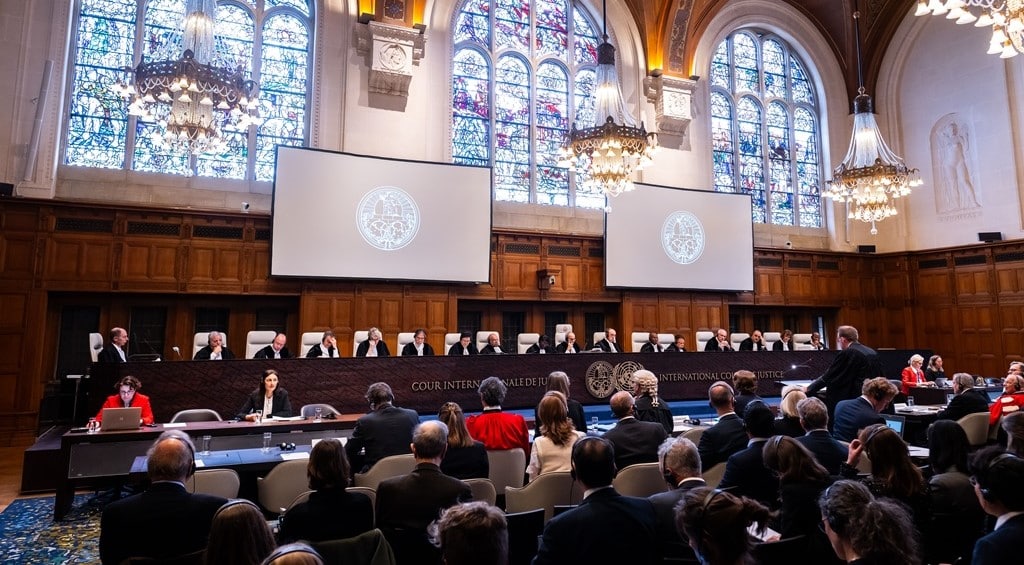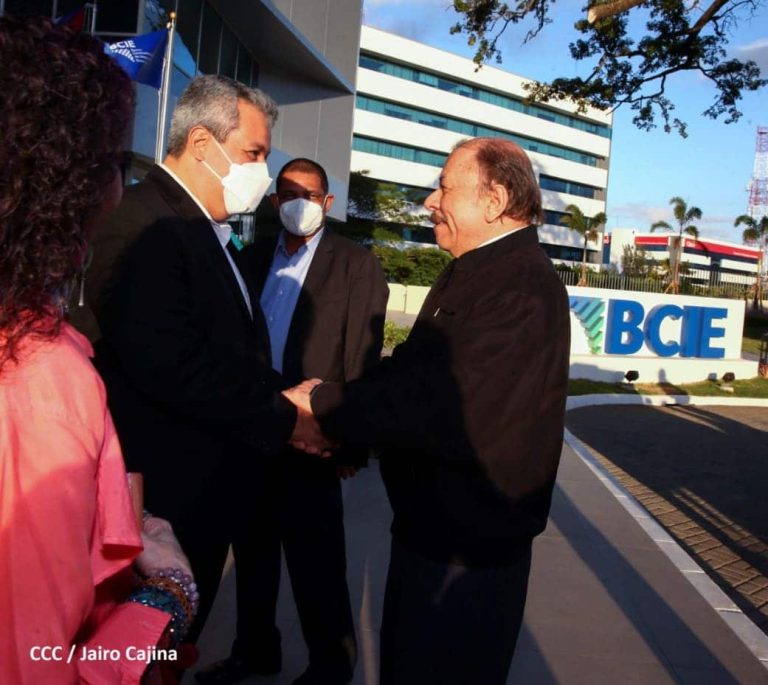24 de febrero 2023

ICJ Rules Against Nicaragua's Request For Germany to Halt Arms Sales to Israel

PUBLICIDAD 1M
PUBLICIDAD 4D
PUBLICIDAD 5D
Dante Mossi agrees to discuss the role of CABEI at the Inter-American Dialogue

The president of CABEI, Dante Mossi, greets Daniel Ortega at the new headquarters of the regional bank in Managua. Photo: Communication and Citizenship Council
InterAmerican Dialogue, a US based think tank, is preparing the conditions for a public debate where Manuel Orozco, director of their Migration, Remittances and Development program and Ryan Berg, director of the Center for Strategic and International Studies’ Americas Program would face Dante Mossi, president of the Central American Bank for Economic Integration (CABEI). The issue on the table would be CABEI’s financial support of the Nicaraguan dictatorship of Daniel Ortega and Rosario Murillo.
It’s estimated that between January 2017 and June 2021, CABEI approved US $2.289 billion in loans and credits to the Ortega government. If this figure is combined with that of the following three semesters, the sum ascends to US $3.5 billion dollars in recent years. These amounts, in Ryan Berg’s judgement, “are disproportionate in comparison to other Central American countries.”
Mossi’s attitude has caused him to be widely accused of complicity with the Nicaraguan dictatorship, or at least of being very willing to ignore the multiple human rights violations in the country. Such elements were enough to have Orozco and Berg invite Mossi to a public debate, a challenge which Mossi – who is Honduran – publicly accepted. Mossi declared he wanted to “demonstrate with facts that are publicly known and how [Orozco] is confusing public opinion.” Mossi in turn invited his debate challengers to set a date and place.
Confidencial has learned that at least four people would participate in the activity: Orozco, Berg, Mossi and a moderator. A date has yet to be agreed upon.
Although the CABEI director centered his response on Manuel Orozco, a Nicaraguan living in Washington, the truth is Orozco hasn’t been the only one to question Mossi. Confidencial has reported on denunciations made by Otton Solis, Costa Rica’s former CABEI representative, who also criticized the current Bank administration’s excessive spending, especially on travel expenses and salaries. In addition, nine of the Bank directors have also written a letter demanding transparency on the part of the Honduran.
In a document prepared by the Center for Strategic and International Studies, Berg noted seven ways in which the United States could try to put the brakes on the behavior of the Central American Bank of Economic Integration, which has proven the most generous source of resources for the dictatorship of Daniel Ortega.
Up until now, despite US Congressional approval of the Nica Act and the Renacer Law, the US hasn’t been able to change the dynamic that allows CABEI to continue its generous financing of the Ortega regime, especially under Mossi’s administration. In November 2023, Mossi will be seeking reelection to another five year term as CABEI’s president.
“Despite having a population less than that of Guatemala and Honduras, Nicaragua has received nearly 26% of CABEI’s loan portfolio. This illustrates the country’s important financial position within the Bank. In fact, Nicaragua has received more funds than Guatemala and El Salvador put together,” Berg declared, recalling that in a recent event of the Center for Strategic and International Studies, a panelist referred to Mossi as “the dictators’ banker.”
The expert observed that CABEI’s support for Nicaragua has allowed them to continue financing the National Police that were sanctioned by the United States for human rights abuses, including the opening of a new Police headquarters in Managua in March 2022, with a cost to CABEI of nearly 20 million dollars.
The low B- credit rating assigned to Nicaragua by Fitch Ratings, “threatens CABEI’s financial position, because they’re investing in a government considered to have low financial security, with one of the lowest classifications on Transparency International’s 2022 Corruption Perceptions Index,” Berg added.
The options Berg proposes have the common denominator of trying to impede CABEI from obtaining more money to finance Ortega, by cutting their capital flow itself, seeking the support of friendly countries that hold stock in the Bank, pressuring the high authorities of the Bank by cancelling their visas, and asking the US Congress and Senate to investigate the Bank.
Berg feels that the United States should assure that their development agencies such as USAID and the US International Development Finance Corporation, as well as entities of the private sector, “suspend all their dealings with the BCIE while the bank continues to be associated with financing dictatorships.”
“The United States should involve Taiwan, South Korea and the European Union (especially Spain) and other interested parties in CABEI, to help create awareness regarding the lack of transparency within the organization,” in order to “cut financing to CABEI,” the analyst affirmed.
“The United States should issue a call to the other founding partners, such as Costa Rica, El Salvador, Guatemala and Honduras, to carefully monitor the decisions and performance of CABEI. (…) The excessive loans to an unstable Nicaragua not only reduce the availability of credit to other countries, but also constitute a regional risk, since the political and economic situation of Nicaragua,” increases migration and instability.
This article was originally published in Spanish in Confidencial and translated by Havana Times
PUBLICIDAD 3M
Periodista nicaragüense, exiliado en Costa Rica. Durante más de veinte años se ha desempeñado en CONFIDENCIAL como periodista de Economía. Antes trabajó en el semanario La Crónica, el diario La Prensa y El Nuevo Diario. Además, ha publicado en el Diario de Hoy, de El Salvador. Ha ganado en dos ocasiones el Premio a la Excelencia en Periodismo Pedro Joaquín Chamorro Cardenal, en Nicaragua.
PUBLICIDAD 3D